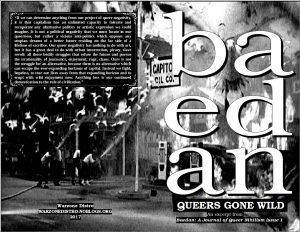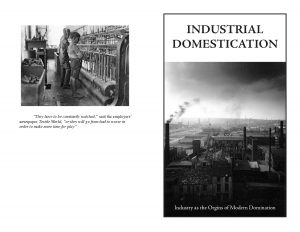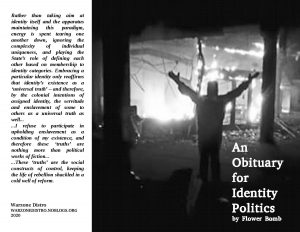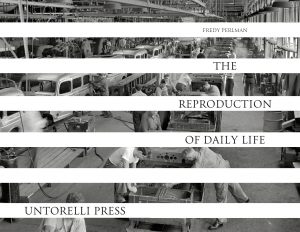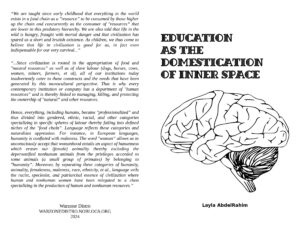
From back cover:
“We are taught since early childhood that everything in the world exists in a food chain as a “resource” to be consumed by those higher up the chain and concurrently as the consumer of “resources” that are lower in this predatory hierarchy. We are also told that life in the wild is hungry, fraught with mortal danger and that civilization has spared us a short and brutish existence. As children, we thus come to believe that life in civilization is good for us, in fact even indispensable for our very survival…”
“…Since civilization is rooted in the appropriation of food and “natural resources” as well as of slave labour (dogs, horses, cows, women, miners, farmers, et al), all of our institutions today inadvertently cater to these constructs and the needs that have been generated by this monocultural perspective. That is why every contemporary institution or company has a department of “human resources” and is thereby linked to managing, killing, and protecting the ownership of “natural” and other resources.
Hence, everything, including humans, became “professionalized” and thus divided into gendered, ethnic, racial, and other categories specializing in specific spheres of labour thereby falling into defined niches of the “food chain”. Language reflects these categories and naturalizes oppression. For instance, in European languages, humanity is conflated with maleness. The word “woman” allows us to unconsciously accept that womanhood entails an aspect of humanness which erases our (female) animality thereby excluding the depersonified nonhuman animals from the privileges accorded to some animals (a small group of primates) by belonging to “humanity”. Moreover, by separating these categories of humanity, animality, femaleness, maleness, race, ethnicity, et al., language veils the racist, speciesist, and patriarchal essence of civilization where human and nonhuman women have been relegated to a class specializing in the production of human and nonhuman resources.”
